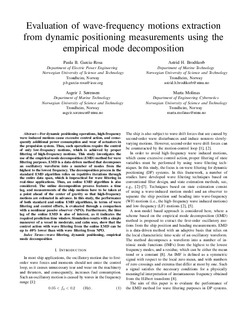| dc.contributor.author | Garcia Rosa, Paula Bastos | |
| dc.contributor.author | Brodtkorb, Astrid H. | |
| dc.contributor.author | Sørensen, Asgeir Johan | |
| dc.contributor.author | Molinas Cabrera, Maria Marta | |
| dc.date.accessioned | 2020-01-27T13:30:33Z | |
| dc.date.available | 2020-01-27T13:30:33Z | |
| dc.date.created | 2019-12-03T11:38:58Z | |
| dc.date.issued | 2019 | |
| dc.identifier.isbn | 9781728114507 | |
| dc.identifier.uri | http://hdl.handle.net/11250/2638102 | |
| dc.description.abstract | For dynamic positioning operations, high-frequency wave induced motions cause excessive control action, and consequently additional power consumption and wear of actuators in the propulsion system. Thus, such operations require the control of only low-frequency motions, which is achieved by proper filtering of high-frequency motions. This study investigates the use of the empirical mode decomposition (EMD) method for wave filtering purposes. EMD is a data-driven method that decomposes an oscillatory waveform into a number of modes from the highest to the lowest frequency. The decomposition process in the standard EMD algorithm relies on repetitive iterations through the entire data span, which is impractical for wave filtering in real-time applications. Thus, an online EMD algorithm is also considered. The online decomposition process features a time lag, and measurements of the ship motions have to be taken at a point ahead of the center of gravity so that high-frequency motions are estimated in advance. In this study, the performance of both standard and online EMD algorithms, in terms of wave filtering and control efforts, is evaluated through a comparison with a nonlinear passive observer (NPO). Furthermore, the time lag of the online EMD is also of interest, as it indicates the required prediction time window. Simulation results with a simple maneuver of a vessel in moderate, and calm seas, show that the control action with wave filtering from the online EMD can be up to 40% lower than with wave filtering from NPO. | nb_NO |
| dc.language.iso | eng | nb_NO |
| dc.publisher | Institute of Electrical and Electronics Engineers (IEEE) | nb_NO |
| dc.relation.ispartof | Proceedings of OCEANS 2019 - Marseille | |
| dc.title | Evaluation of wave-frequency motions extraction from dynamic positioning measurements using the empirical mode decomposition | nb_NO |
| dc.type | Chapter | nb_NO |
| dc.description.version | acceptedVersion | nb_NO |
| dc.identifier.doi | 10.1109/OCEANSE.2019.8867326 | |
| dc.identifier.cristin | 1755966 | |
| dc.description.localcode | © 2019 IEEE. Personal use of this material is permitted. Permission from IEEE must be obtained for all other uses, in any current or future media, including reprinting/republishing this material for advertising or promotional purposes, creating new collective works, for resale or redistribution to servers or lists, or reuse of any copyrighted component of this work in other works. | nb_NO |
| cristin.unitcode | 194,63,20,0 | |
| cristin.unitcode | 194,64,20,0 | |
| cristin.unitcode | 194,63,25,0 | |
| cristin.unitname | Institutt for elkraftteknikk | |
| cristin.unitname | Institutt for marin teknikk | |
| cristin.unitname | Institutt for teknisk kybernetikk | |
| cristin.ispublished | true | |
| cristin.fulltext | postprint | |
| cristin.qualitycode | 1 | |
